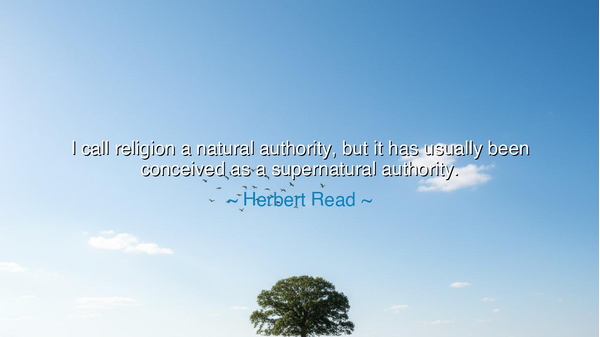
I call religion a natural authority, but it has usually been
I call religion a natural authority, but it has usually been conceived as a supernatural authority.






“I call religion a natural authority, but it has usually been conceived as a supernatural authority.” Thus spoke Herbert Read, the philosopher and poet who sought to bridge the realms of spirit and reason, the sacred and the human. In this profound statement, he invites us to reexamine the nature of religion itself—not as something imposed from the heavens, but as something born from the deepest soil of the human soul. He tells us that religion is natural, that it arises not from lightning-struck mountains or celestial decrees, but from the yearning of the heart, the wonder of the mind, and the moral intuition of the spirit. For Read, the sacred is not distant; it is within us. It is the whisper of conscience, the rhythm of compassion, and the law of harmony that governs both man and the universe.
When Read speaks of “natural authority,” he means that religion is rooted in the fabric of human existence. It is not a chain that binds, but a compass that guides. It springs from our awareness of beauty, justice, and love—from the awe we feel when we gaze upon the stars or cradle a newborn child. This kind of religion does not demand blind obedience; it awakens understanding. It does not divide mankind by doctrine; it unites us through shared reverence for life itself. In contrast, the “supernatural authority” of religion, as it has so often been taught, demands submission to powers that lie outside and above us—to decrees claimed to come from the unseen, interpreted by the few, and enforced upon the many. Read laments this distortion, for when religion becomes external and absolute, it ceases to elevate the soul; it enslaves it.
The origin of this thought lies in Read’s lifelong engagement with art, philosophy, and anarchism. He believed that true order does not come from hierarchy or fear, but from the natural harmony of life. He saw religion not as a system of control, but as an organic expression of humanity’s spiritual intelligence. To him, morality, compassion, and creativity are not gifts from the gods, but manifestations of the divine already dwelling within us. He stood among the few who dared to say that holiness is not a thing apart from life—it is life itself, lived in awareness. And so he called religion a natural authority, meaning that its truest form is the inner voice that calls us to kindness, truth, and unity, not the voice that thunders commands from the clouds.
History offers us many examples of the battle between these two visions of religion—the natural and the supernatural. Consider the story of Siddhartha Gautama, the Buddha. Born a prince among riches, he saw the suffering of the world and sought answers. Yet when he turned to the priests and their rituals, he found no peace. They worshipped supernatural powers, performed sacrifices, and spoke of heavens beyond, but Siddhartha found his enlightenment not through them, but through understanding life as it is—through observing the breath, the body, and the mind. His revelation was that salvation lies not in the favor of gods, but in the realization of one’s own consciousness. Thus, Buddhism, in its purest form, became a religion of natural authority, grounded in awareness, compassion, and harmony with the truth of being.
Read’s words, then, are not a rejection of the sacred, but a restoration of it. He does not deny the divine; he brings it home. He calls us to see that the sacred does not reside only in temples or scriptures, but in the heart that beats and the world that breathes. When we treat religion as natural, we see divinity in every leaf, every face, every act of love. But when we treat it as supernatural, we risk turning faith into fear, reverence into obedience, and wisdom into dogma. The true authority of religion is not that it commands us from above, but that it awakens us from within.
The lesson, therefore, is one of liberation. Seek not religion as a ladder to heaven, but as a bridge to life. Do not bow to unseen thrones; instead, listen to the quiet law that moves your conscience. Practice your faith not through fear, but through understanding. Let your worship be not in words alone, but in your actions, your art, your compassion. When you act with integrity, when you forgive, when you love—then you are practicing the most ancient and truest religion of all, the religion of the heart.
So, my child of earth and spirit, remember this wisdom of Herbert Read: “Religion is a natural authority.” Let it guide you as sunlight guides the flower, not as chains bind the prisoner. See the divine not as something foreign, but as the life that flows through you and all things. Walk gently upon the world, honoring its balance, its beauty, its living order. For when you awaken to this truth, you will find that the sacred is not beyond the stars—it is here, in your breath, in your kindness, in the quiet certainty that you and the universe are one. And in that knowing, you will find peace—not given from above, but born within.






AAdministratorAdministrator
Welcome, honored guests. Please leave a comment, we will respond soon